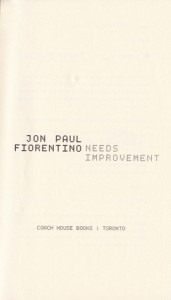- Needs Improvement
- Written by: Jon Paul Fiorentino
- (Coach House Books)
- [88 pp., soft cover, perfect bound]
- Montréal, QC
- ::web/words::
From the needed improvement of Joshua Robinson:
Ethnomethodology is an interesting world: language and interpretation, semiotics and genealogy… the tenants of a socio-communicative dictum that regards speech, understanding, and response as being bound to our experiences and familiarities with what we are absorbing in an institutional context. Jon Paul Fiorentino’s ‘Needs improvement’ is both illuminating and terrifying; an anthropological foray into the qualification of report cards, schematic renderings, and city mottos that are imbued with significance on the pretence of their communicating something meaningful… anything meaningful.
With his poetically phenomenological study of semantics, Fiorentino engages the (post)modern (post)structures representing the contradictions bound in interpretations of the written word. It is here that we find Fiorentino’s premise behind ‘Needs Improvement’: how do we as a culture, having evolved socially to the point where the conveyance and interpretation of content and context should be a relatively simple process, engage with information? How do we choose which information to absorb, which to respond to, and how to respond to it? Language and written word, in this sense, becomes increasingly complicated. Our misunderstandings reveal an asynchronicity between our logocentric pursuit for a universal body and system of thought and our need as individuals to be able to construct our own systems of thought and meaning designation. His poetry holds enormous sociological weight, and we–as the anxiously disillusioned reader–are called to construct an identity of our own, one existing above the mess of the imparted elitist and institutionalized heteronormative conceptualizations of what it means to be ‘informed’.
Des améliorations nécéssaires de Joshua Robinson: (Traduit par le cerveau mis à l’épreuve d’AnneMarie Papillon)
L’ethnométhodologie est un monde intéressant : le langage et l’interprétation, la sémiotique et la généalogie… les partisans d’un dictum socio-communicatif qui considère la parole, la compréhension et la réaction comme étant liées à nos expériences et connaissances de ce que nous assimilons dans un contexte académique. Needs Improvement de Jon Paul Fiorentino est à la fois éclairant et terrifiant ; c’est une intrusion anthropologique dans l’utilisation des bulletins scolaires, des interprétations schématiques et des devises municipales grandement impregnés de leur prétention à communiquer quelque chose qui a du sens… n’importe quoi qui a du sens.
Dans son étude poétiquement phénoménologique de la sémantique, Fiorentino utilise les (post)structures (post)modernes pour représenter les contradictions contenues dans l’interprétation des textes écrits. C’est ici que nous comprenons la prémisse de Fiorentino derrière Needs Improvement ; comment envisageons-nous l’information, nous qui faisons partie d’une culture ayant assez évolué socialement pour faire de la transmission et de l’interprétation du contexte et du contenu un procédé relativement simple ? Comment choisissons-nous les informations à assimiler, celles auxquelles nous devrions réagir et même, la manière d’y réagir ? En ce sens, le langage et les écritures deviennent de plus en plus compliqués. Nos incompréhensions révèlent un manque de synchronisme entre notre poursuite logocentrique d’un système de pensées universel et notre besoin en tant qu’individu de construire nos propres systèmes de pensées et de significations. La poésie de Fiorentino contient un poids sociologique énorme, et nous – les lecteurs anxieusement désillusionés – sommes appelés à construire notre propre identité, identité qui existe malgré les dégâts des conceptualisations institutionnelles élitistes et hétéronormatives qui essaient de nous faire gober ce que c’est que d’être « informé ».

